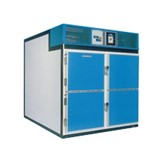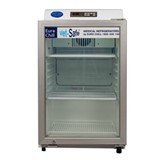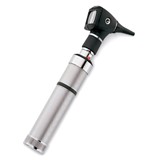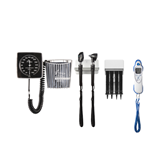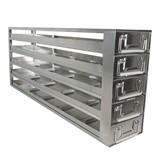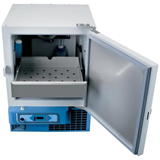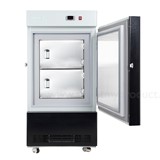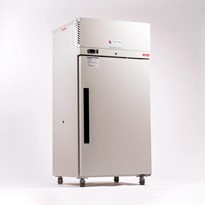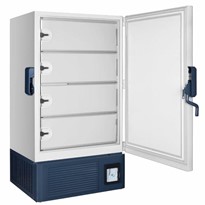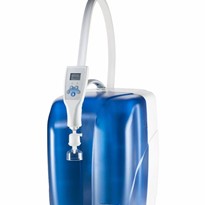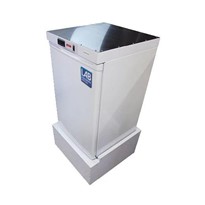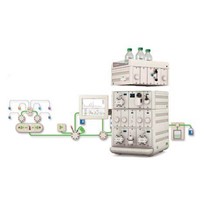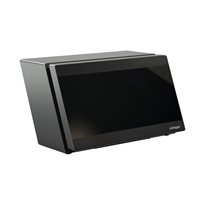Whether you're storing sensitive biological materials, pharmaceuticals, or conducting research that requires precise temperature control, understanding the distinctions between freezer types is crucial.
This article walks you through the essential aspects of laboratory freezers, biomedical chest freezers, and ultra-low-temperature freezers, helping you make an informed decision tailored to your specific needs.
Understanding Laboratory Freezer Categories
Laboratory freezers are not a one-size-fits-all solution. They come in various models designed to fulfil distinct roles within scientific, medical, and research settings.
The primary categories include:
- Premium laboratory freezers, designed for general lab storage at -20°C to -30°C
- Biomedical chest freezers, which offer lower temperatures ranging from -30°C to -60°C
- And ultra-low-temperature (ULT) freezers that maintain environments at -86°C for the most sensitive of samples
Selecting the right category hinges on understanding the specific temperature requirements and storage conditions your work demands.
Key Features of Premium Laboratory Freezers
Premium laboratory freezers are the backbone of many research and healthcare environments, offering reliable storage solutions for a wide array of laboratory items.
These freezers are engineered to meet the exacting standards of laboratory and pharmaceutical applications, ensuring precise temperature controls and consistent performance. Built-in alarm systems and precise controls are standard, safeguarding delicate substances such as antibodies and cell cultures from temperature fluctuations. When considering a premium laboratory freezer, think about your lab's daily demands. Will you be storing temperature-sensitive drugs, biological specimens, or perhaps both?
Exploring the Versatility of Biomedical Chest Freezers
Biomedical chest freezers offer a versatile solution for more specialised applications.
These units are particularly beneficial in settings like hospitals, blood banks, and research institutions where the storage of viruses, bacteria, and biological samples like blood cells and tissues is a daily requirement.
The ability to maintain lower temperatures makes them ideal for preserving the integrity of these materials over longer periods. Additionally, their low-temperature capabilities are invaluable for testing special materials and storing sensitive marine supplies and electronic devices. Consider a biomedical chest freezer if your work involves a diverse range of biological products requiring stringent temperature control.
Delving into Ultra-Low-Temperature Freezers
For the most critical storage needs, ultra-low-temperature freezers provide the necessary environment to ensure the long-term preservation of biological products.
These freezers are indispensable in fields such as bioengineering, epidemic prevention, and research, where the storage of viruses, bacteria, and cell cultures at temperatures as low as -86°C is required.
ULT freezers are designed with advanced insulation and cooling technologies to maintain stable temperatures, even in the event of power disruptions. They are the go-to choice for applications where the utmost temperature control and sample integrity are paramount.
Matching Freezer Types with Your Specific Needs
Selecting the right laboratory freezer involves more than just comparing temperature ranges. You need to consider the nature of the materials you're storing, the available space in your laboratory, and the level of temperature stability required.
Premium laboratory freezers are suited for a broad range of applications and are a reliable choice for everyday lab storage needs. Biomedical chest freezers, with their lower temperature ranges, are better suited for specialized medical and research applications. ULT freezers are necessary when storing highly sensitive biological samples that require the utmost in temperature stability.
Assess your needs carefully to ensure you choose a freezer that not only meets your current requirements but can also accommodate future demands.
Maintaining Your Laboratory Freezer for Optimal Performance
Once you've selected the perfect laboratory freezer for your needs, maintaining it properly is key to ensuring optimal performance and the longevity of your samples. Regular maintenance tasks include cleaning the interior and exterior, checking and cleaning door seals, and defrosting (for models that require it).
Additionally, monitoring the freezer's temperature and alarm systems can help catch potential issues before they result in sample loss. Establishing a regular maintenance schedule can extend the life of your freezer and provide peace of mind, knowing that your samples are stored under the best possible conditions.
Choosing the right laboratory freezer is a critical decision that can significantly impact the quality and integrity of your work. You can select a model that best suits your needs by understanding the differences and specific uses of premium laboratory freezers, biomedical chest freezers, and ultra-low-temperature freezers.
Remember, the right freezer not only provides the necessary temperature control but also ensures the safety, integrity, and longevity of your valuable samples.






